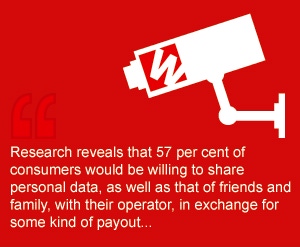Dystopian futures almost always feature some kind of omnipotent presence—political, corporate or non-human—beneath whose gaze the masses cringe and squirm. And the power that these entities enjoy often depends, in a nod to the grim realities of the past, on the willingness of individuals to betray one another in return for a scrap of reward or approval. Central to these scenarios is the suggestion that human beings are complicit in their own subjugation; too quick to divide and invite the rule of tyranny.
June 21, 2013

By The Informer
Dystopian futures almost always feature some kind of omnipotent presence—political, corporate or non-human—beneath whose gaze the masses cringe and squirm. And the power that these entities enjoy often depends, in a nod to the grim realities of the past, on the willingness of individuals to betray one another in return for a scrap of reward or approval.
Central to these scenarios is the suggestion that human beings are complicit in their own subjugation; too quick to divide and invite the rule of tyranny.
So the Informer was disappointed but not surprised by Amdocs research published this week revealing that 57 per cent of consumers would be willing to share personal data with their mobile operator, including their location, the names of their top five Facebook friends and information on their family members, in exchange for some kind of payout. More than half of the 3,900 people surveyed would even be happy for that data to be passed on to a third party.
61 per cent said they would exchange personal data for improved network speeds, while 65 said they’d put out for discounted tariffs. This suggests that consumers do not believe they deserve the best service available on the grounds that they pay for it, which is great news for the operator community.
Although given that customer loyalty is such a grail for the mobile operator community, it might want to take note of the fact that familial loyalty can be so cheaply bought and sold.
The research itself was conducted pre-PRISM and we don’t know whether it would yield different results if carried out today. But according to Amdocs’ Alastair Hanlon, head of market insight and strategy, the reason people were so upset about PRISM was not that their data was accessed but that it was accessed without their knowledge.
“Our research shows that if people know their data is being collected by operators they are comfortable with it,” Hanlon said.
The NSA missed a trick here, didn’t it? It needn’t have scurried about in the shadows with its top secret court orders; it could have simply offered everyone in the US a few donut vouchers and they’d have jumped at the chance to hand over their data. If it had been smart enough to set up a donut business at which those vouchers could have been redeemed the NSA would have made a fortune into the bargain.
And if we wind up with a scenario where US citizens are given incentives to permit access to their data—tax breaks, say, or healthcare—you read it here first.
Many pages have been devoted to the corrupting influence of power and the observation that the more power you have the more corrupt you are in danger of becoming. This week the board of directors at Orange were channeling Tammy Wynette, offering vocal support for their man Stéphane Richard, who has had his collar felt in connection with a corruption investigation in France going back to 2008.
Richard previously worked in the French Finance Ministry and he faces questions relating to his role in a 2008 payment made to businessman Bernard Tapie. He was arrested last week and his detention was extended by 24 hours on Tuesday by the Court of Justice of the Republic, which investigates ministerial misconduct in France.
In a statement this week, the Orange board said it had: “Decided to reassert its full confidence in Stéphane Richard…In particular the Board considers that the legal measures affecting Stéphane Richard do not impede his ability to fully and effectively lead Orange as its chairman and [CEO]“.
Richard should beware the false sense of security, however, as boards and their votes can be fickle. Readers will remember that, in October 2012, TeliaSonera CEO Lars Nyberg was given public backing by his board in the midst of his own corruption scandal, only to be ousted in February this year. This week it was announced that his replacement will be Johan Dennelind, until now the CEO of South African operator Vodacom.
Back to Orange, though, and this week the French incumbent became the first operator to introduce Joyn services in its home market. France is the ninth country into which Joyn services have been released and 14 operators have so far pledged their support to the GSMA’s rich messaging solution.
To begin with services will be available through a compatibility upgrade to the Orange iOS and Android OTT comms app Libon but later this year devices will be made available on which Joyn is native.
The Jury is still out on Joyn—probably milling around on the courthouse steps sending messages to its friends over WhatsApp. It has been suggested by the president of SAP mobile services that only a handful of large operators will deploy their own Joyn technology, with others more likely to use cloud-based hosted solutions for reasons of expedition, expedience and expenditure.
The Orange deployment is built on IMS kit supplied by Nokia Siemens Networks and the Informer saw one cheerleader tweet that “the more operators on Joyn the more successful it will be”. That should be a given, but it’s not.
Leading the industry in Shifty Business this week, Alcatel-Lucent has followed the lead of Nokia Siemens Networks in repositioning itself as a specialist, with a focus on IP networking and fixed and mobile ultra-broadband access. Nu-ALU will emerge from its chrysalis/focus reassignment surgery—the overall plan is called Shift—a good bit lighter, as it intends to generate at least €1bn selling off assets including its submarine cable business.
By 2015, IP Networking and Ultra-Broadband Access are set to represent 85 per cent of R&D investment, looking at what the company describes as a clearly differentiated management approach to the Core Networking segment businesses managed for growth, and the Access segment- including wireless and fixed access – and “other” segment, managed for cash and focused on Ultra-Broadband Access.
Ovum warned that ALU might find it difficult to exit from legacy technologies but conceded that Chinese vendors have made some Western vendors’ position more or less untenable.
Commenting on the announcement, Ron Kline, principal network infrastructure analyst, at Ovum, said that Alcatel-Lucent’s strategy change shows just how fast market dynamics have changed in a market once dominated by the large Tier-1 telecommunication providers that are its customers, but increasingly under siege by internet content providers, while vendors based in the West have been out-competed by Chinese players.
“The overall broadband access market is in decline and much of the current growth is in China…Given the extent of the installed base of legacy products and the relevant customers, accelerating an exit could prove difficult. Alcatel-Lucent faced a similar dilemma when it rationalized its products back in 2006 after the merger however customer protests made the company reverse its decision,” said Ovum analyst Ron Kline.
Alcatel Lucent is not the only company with weight loss on its mind as Huawei has been making a lot of noise this week about its new flagship Android device, the Ascend P6, which measures 6.18mm from front to back.
Cramming everything into such a svelte form factor has clearly been a labour of love for the people responsible. In one video promoting the new smartphone a Huawei design director can be seen contemplating the handset wearing an expression of lovelorn anguish, as if he’s got a serious case of lover’s nuts.
The marketing department’s Superego has flung itself aside, allowing the Id to revel in hyperbole that, even within the framework of the nonsense talked about mobile phones in adverts, applies every bit as much pressure to the envelope as does the handset’s slender profile.
“It seems that its extraordinary elegance would become part of your soul, changing your way of acting and thinking, so that your own life would be elegant too,” says the design director. “Everyone that uses this phone immediately falls in love with it.”
Then we see three blindfolded consumers turning the thing over in their hands, being asked to describe it.
“It’s very hard,” says one
“It has a nice curvature,” says the next.
“It fits in the palm of my hand,” says the third.
“Oh, it’s pink!” says the first, as she removes her blindfold.
Had you watched the video wearing a blindfold yourself, you could have been forgiven for reaching the wrong conclusion.
The Ascend P6 even has a tricksy, native camera function called the Beauty Shot that applies a sort of Photoshopesque gloss to facial pictures, enabling users to make themselves look more attractive. This, of course, is exactly what Huawei is trying to do. It wants to be more attractive to consumers, and more attractive to the Western authorities that remain abidingly suspicious of its intentions. Marketing a function that encourages people to mask their own faces may or may not be the best way of going about it!
Over on the network side, Huawei has taken on the field and civil maintenance and management of Vodafone’s xDSL and mobile networks in Spain. The five year contract sees Huawei taking on 103 Vodafone employees as well as responsibility for maintenance of Vodafone’s mobile access network infrastructure.
In other handset news, open source software developer Canonical has established a Carrier Advisory Group for its Ubuntu smartphone OS. The CAG features a number of leading operators, including LG UPlus, SK Telecom and Korea Telecom from Asia Pacific and Deutsche Telekom, EE, Telecom Italia and Portugal Telecom from Europe. The announcement also referenced “the leading Spanish international carrier,” suggesting that Canonical did not have clearance to use Telefónica’s name in its release.
Canonical said that the CAG will hold regular meetings in a bid to steer the development of the Ubuntu mobile platform. Key discussion topics will include strategies for differentiation, application portability from Android and Blackberry environments, revenue share models for publishers operators and device vendors and market positioning.
In return for their participation the CAG members will gain early access to information on platform development as well as commercial devices when they arrive, which is scheduled for later this year.
Operators can often be heard holding forth on the importance of a stable, commercially successful third device ecosystem to compete with those led by Apple and Google. At MWC this year a number of operator CEOs appeared at a Mozilla press conference to give public support to the new Firefox smartphone OS.
“The mobile industry remains on the lookout for an independent platform that enables innovation and differentiation,” said David Wood, who will head the group. And he ought to know; the former Psion engineer and one of the founder members of the original Symbian collaboration.
“The Carrier Advisory Group will have ample opportunity to influence the Ubuntu roadmap, and take full advantage of the potential in this emerging platform.”
Operators need to tread pretty carefully, here. They haven’t succeeded in trying to play device ecosystems off against one another in the past and backing two more pliant horses may well result in neither coming home.
One name conspicuously absent from the Ubuntu CAG is Vodafone, which has plenty to keep it busy at the moment. Last week it made a play for German cable provider Kabel Deutschland, a move which this week drew a counter-offer from international cable player Liberty Global. None of the three have released details about the size of the offers, although the Financial Times reported that Liberty had trumped Vodafone with a bid of €7.5bn.
Liberty already operates in the German market, under the Unity Media brand, and has 11.3 million service subscribers—6.7 million video, 2.3 million broadband and 2.3 million fixed telephony at an average of 1.60 service subscriptions per customer relationship. The firm ranks second in the German cable market and the deal would therefore require approval from the competition authorities.
Earlier in June Liberty completed the acquisition of UK fixed broadband and cable operator Virgin Media, which also operates the Virgin Mobile MVNO.
Meanwhile reports also emerged that Vodafone is also considering a bid for Italian fixed operator Fastweb. Vodafone already offers fixed line and TV services in the Netherlands and Portugal.
In the US rumours continue to swirl around the prospect of Verizon buying Vodafone out of the VerizonWireless joint venture. This week ratings agency Moody’s offered its take on the prospect, saying that each company could keep its A3 rating so long as Verizon funded the deal with a balance of debt and equity and Vodafone used the proceeds to drive down debt, sweeten shareholders and embark on some astute M&A.
Sticking with the US, a report issued this week by CitrixByteMobile said that streaming audio now accounts for 12 per cent of mobile data volume in North America, with internet radio the overwhelming majority of that traffic.
Other statistics from the report include the fact that mobile search has increased by an average of 25 per cent per subscriber worldwide since February 2012 while Facebook now accounts for five times as much data volume (five per cent of overall mobile data traffic) as it did in February 2012.
Given that a single YouTube video watched on a mobile device generates as much data as ten Facebook sessions, the number of Facebook sessions is clearly growing very quickly. Video accounts for over a third of mobile data traffic in the US and almost half in the rest of the world, with YouTube accounting for 82 per cent of all video entertainment traffic.
“Interestingly, operators typically make little or no revenue from this traffic beyond that associated with data usage,” said Chris Koopmans, vice president and general manager of Service Provider Platforms, Citrix, bringing operators back down to Earth with a bang.
Google will be hoping that the same fate does not await its new Loon project, which will see the firm dangling wireless internet connectivity from a squadron of weather balloons that are moved into position by being raised and lowered in and out of stratospheric winds. The project kicks off later this month with a trial in New Zealand.
It’s not a load of hot air, it’s helium
Take care
The Informer
Read more about:
DiscussionYou May Also Like





.png?width=300&auto=webp&quality=80&disable=upscale)

.png?width=300&auto=webp&quality=80&disable=upscale)
_1.jpg?width=300&auto=webp&quality=80&disable=upscale)



.png?width=800&auto=webp&quality=80&disable=upscale)